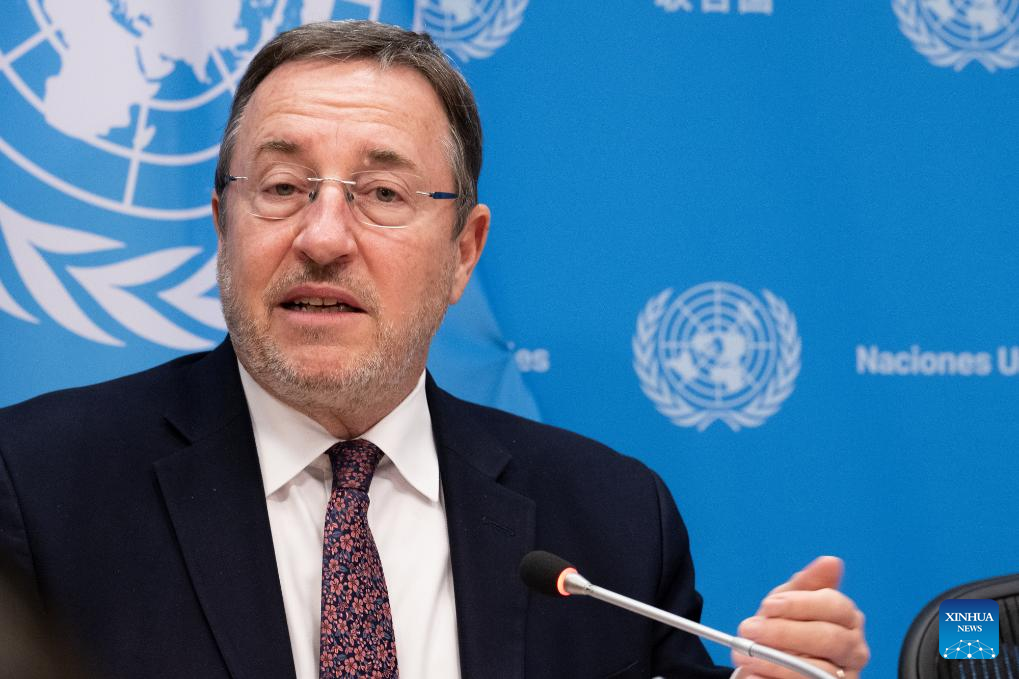
United Nations Development Programme administrator Achim Steiner briefs reporters on the 2023/24 Human Development Report (HDR) at the UN headquarters in New York on March 13, 2024. (Manuel Elias/UN Photo/Handout via Xinhua)
UNITED NATIONS, March 13 (Xinhua) -- Uneven development progress is leaving the poorest behind, exacerbating inequality, and stoking political polarization on a global scale, according to a new report released Wednesday by the United Nations Development Programme (UNDP).
The result is a "dangerous gridlock" that must be urgently tackled through collective action, the 2023/24 Human Development Report (HDR), titled "Breaking the Gridlock: Reimagining cooperation in a polarized world" says.
The report reveals a troubling trend: the rebound in the global Human Development Index (HDI) - a summary measure reflecting a country's Gross National Income per capita, education, and life expectancy - has been partial, incomplete, and unequal.
The HDI is projected to reach record highs in 2023 after steep declines during 2020 and 2021. But this progress is deeply uneven. Rich countries are experiencing record-high levels of human development while half of the world's poorest countries remain below their pre-crisis level of progress.
Global inequalities are compounded by substantial economic concentration. As referenced in the report, almost 40 percent of global trade in goods is concentrated in three or fewer countries; and in 2021 the market capitalization of each of the three largest tech companies in the world surpassed the gross domestic product (GDP) of more than 90 percent of countries that year.
"The widening human development gap revealed by the report shows that the two-decade trend of steadily reducing inequalities between wealthy and poor nations is now in reverse. Despite our deeply interconnected global societies, we are falling short. We must leverage our interdependence as well as our capacities to address our shared and existential challenges and ensure people's aspirations are met," said UNDP administrator Achim Steiner at the launching press conference of the report.
"This gridlock carries a significant human toll. The failure of collective action to advance action on climate change, digitalization or poverty and inequality not only hinders human development but also worsens polarization and further erodes trust in people and institutions worldwide," he added.
Political polarization is a growing concern "with global repercussions." Along with a sense of powerlessness, report authors say, it is fueling inward-turning policy approaches - starkly at odds with the global cooperation needed to address urgent issues like the decarbonization of our economies, misuse of digital technologies, and conflict. This is particularly alarming in light of 2023's record-breaking temperatures, which emphasize the immediate need for united action to tackle the climate crisis, or in the advent of artificial intelligence as a new and fast-evolving technological frontier with little or no regulatory guard rails.
The report highlights that deglobalization is neither feasible nor realistic in today's world and that economic interdependence remains high. It points out that no region is close to self-sufficiency, as all rely on imports from other regions of 25 percent or more of at least one major type of goods and services.
"In a world marked by increasing polarization and division, neglecting to invest in each other poses a serious threat to our wellbeing and security. Protectionist approaches cannot address the complex, interconnected challenges we face, including pandemic prevention, climate change, and digital regulation," Steiner said.
"Our problems are intertwined, requiring equally interconnected solutions. By adopting an opportunity-driven agenda that emphasizes the benefits of the energy transition and of artificial intelligence for human development, we have a chance to break through the current deadlock and reignite a commitment to a shared future," he added.
The report emphasizes how global interdependence is being reconfigured and calls for a new generation of global public goods. It proposes four areas for immediate action, such as planetary public goods, for climate stability, "as we confront the unprecedented challenges of the Anthropocene," and digital global public goods, for greater equity in harnessing new technologies for equitable human development.
In this context, multilateralism plays a fundamental role, the report argues, because bilateral engagements are not able to address the irreducibly planetary nature of the provision of global public goods.
More key data from the report include: in 2023, all 38 countries that are members of the Organization for Economic Co-operation and Development achieved higher HDI scores compared to their levels in 2019; and among the 35 least developed countries that experienced a decline in their HDI in 2020 and/or 2021, more than half (18 countries) have not yet recovered to their human development levels of 2019.
The report cites research indicating that countries with populist governments have lower GDP-growth rates. Fifteen years after a populist government assumes office, the GDP per capita is found to be 10 percent lower than it might under a non-populist government scenario.
The Human Development Report is an editorially independent publication of the United Nations Development Program. ■



